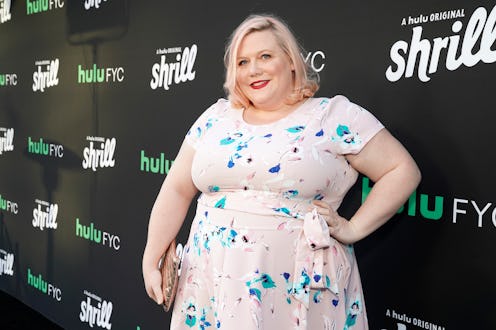
When Lindy West — author, poker of holes in propaganda of all kinds, good witch — got to the podium at The Riveter summit Wednesday and announced that she was about to give the first reading of her new book, The Witches Are Coming, the audience of late Gen X and early millennial feminists hooted like Target had just announced a Rachel Comey capsule collection.
"To let yourself believe that we’re just at the end is really dangerous."
The book, based on West's similarly named viral 2017 New York Times opinion column, had been anticipated in these circles, and a reading from West is not typical corporate women's event fare. As though to underscore that point, West read a chapter entitled, “Ted Bundy Was Not Charming — Are you High?” It is about the hagiography of the serial killer and how the myth of Bundy’s charisma is actually just cover for a culture that hates women and valorizes men who act on that hatred. The excerpt included a list of things that, apparently, don’t make a man unlikeable, like “Stealing everyone’s money,” “Genocide,” and “Being a DJ.” To the grimace-laughter of everyone listening, West then read a list of “Things that DO make a woman unlikeable: Voice, Body, Hair, Shoes, Kids, No kids, Sex, No sex, Money, No money, Inhale, Exhale, Metabolize food, Shed skin cells, Use muscles to move bones around, Do anything, Die.”
You might assume that West's prodigious talent and output are what get her up in the morning, like some funny genius moth drawn to the light of her inner muse, but no — it's a challenge for her too. "It’s tempting to fall into despair, which is really unproductive,” West told Riveter CMO Kerry Murphy in the Q&A that followed. "To let yourself believe that we’re just at the end is really dangerous. I try to find joy and hope and mirth in my work, because I think that’s the only way that we’ll survive. Because we do have power. It’s not over.”
"What’s the point of living in a society except taking care of each other?"
She acknowledges the privilege in that statement. Based in the Pacific Northwest, West says, "I’m really lucky ... I have a really strong foundation that makes it feel less scary to put myself out there.” But that also leads into the second type of despair, a byproduct of the first but also the internet: the despair that comes from shame. It’s the sense that you are not good enough and will never be, that you will always be viewed as unacceptable. West has encountered this throughout her career, particularly linked to her weight. She wrote about it in her memoir, Shrill, which she then wrote into a Hulu series starring Aidy Bryant whose second season will premiere in January.
"People are conditioned to view fat people as physically lazy but also intellectually lazy. I didn’t take myself seriously for a long time.” She recalled the first thing she ever wrote publicly about it, in response to a boss who dismissed her concerns about the things he was writing publicly about fat people. “I went rogue and wrote a manifesto and published it on the blog,” she recalled. "I remember it was sort of the end of me just accepting however you wanted to treat me and really believing that I had something to say and that it was valuable. It was the first time that I felt a piece of my writing move the world in any way." For West, this became the real despair antidote. Not because of the catharsis for her, though that was helpful, but because it offered other people the known despair remedy of Not Feeling Alone.
"What’s the alternative? I agree that I’m fat and gross and don’t deserve respect and dignity? That’s not an option for me."
“Once I started writing really vulnerable things and saying things that are a little more rattling and a little more challenging, I started to hear from more people who needed to hear those things. And ... it’s addictive. There’s nothing better.”
She has of course received various personal, physical threats in response to her work. "I worry about my family, I worry about my kids,” she said, but she pushes on. "It’s absolutely worth any cost. Because otherwise what’s the point of being alive? What’s the point of living in a society except taking care of each other? The least I can do to use the platform that I’m lucky enough to have is to make noise about things that I believe in really strongly...And truly, once I started doing it, there was no going back."
Besides, West said, "What’s the alternative? I agree that I’m fat and gross and don’t deserve respect and dignity? That’s not an option for me. I used to feel that way, and if there are people out there who I can help climb out of that pit, I’m happy to do it."